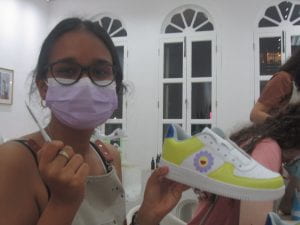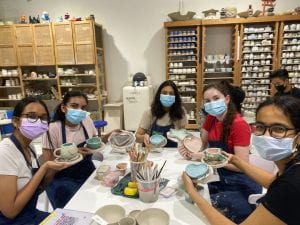Some more photos from the week!






Some more photos from the week!






We are currently midway through Project Week and it has been much more enjoyable than we initially anticipated. We have been used to seeing the G11s go off to different countries in South East Asia to truly challenge themselves and plan a comprehensive trip. So, it did feel like our Project Week here in Singapore would not live up to much.
However, since starting our activities I’ve quickly realised the value of exploring Singapore. While we are doing a variety of activities, some of which may not be considered so out of our comfort zone, the real learning point has been navigating parts of Singapore that we have never been to. On our first day, we travelled to our Pottery class by public transport in an area which none of us had ever visited before. The class was also far into an unknown hilly neighbourhood so we had to navigate our path from and to the bus stop using Google Maps which was a good experience.
This morning, we went for our service at Willing Hearts to help in packing food for distribution and cleaning up after. I loved being able to talk to strangers and work with them to pack the food. Our group was quite split up as we worked on different stations in the same room, so it was great that we had to collaborate with new people. A lot of them were working adults so it was quite different to what we are used to, usually working with students our age. It was interesting to learn about why they choose to volunteer at Willing Hearts and also see the effort everyone was putting in to complete the work in time for the food deliveries.
We are ending the day at a punch needle class, also in an unknown neighbourhood, so it will be fun to find our way there using public transport and also, learn a completely new skill. Hopefully, our work looks good and we can feel proud taking it back home!



I’ve completed a term of Humanities Magazine this year as a leader! It has been the most rewarding experience, especially having been a part of the publication process for two years prior as well.
One of the biggest challenges was learning how to manage a team and get the work done. Although I had ideas about how I wanted to run the activity with my co-leader, it was much easier said than done. It is a fascinating and valuable process of planning timelines, roles and sponsorships before the opportunity of implementing and working on them. My co-leader and I have experimented with different meeting layouts to ensure that everyone is productive and engaging with the work. It’s been rewarding to take that responsibility and figure out how best to organise the team according to everyone’s work habits and personalities, as well as our own.
I will admit, we are a bit behind schedule currently. Unfortunately, due to G10 mock exams at the end of the last term and people leaving early for holidays, we had a 3-4 week period with low attendance and productivity. So we are trying to plan how best to catch up with all the work and meet our goal of sending the finished magazine to printers in early March. It’s been somewhat challenging to balance the stress of our publishing timeline and acknowledge that at the end of the day, we are all high school students who have other things to do. It’s reasonable for people to not prioritise an activity outside of school subjects. In an ideal world, everyone would complete all the work in the time agreed on, but that isn’t realistic. So, it has also been a good learning opportunity to practically and effectively plan tasks and deadlines to allow leeway for missing elements.
In terms of victories, we’ve secured a sponsorship for our magazine that was an exciting accomplishment since we coordinated it entirely on our own without teacher support! We got to plan and negotiate a proper transaction, something new to us. We are also nearing the start of season 3 for activities, so we are excited to see if new people join and what roles they may take on. I’m hoping that after the lunar new year break, once attendance comes back to regular, we can get back to collaborating and communicating effectively to get this magazine complete!
Woman’s World, Dispatches from the Edge, and A Thousand Cranes
Gender roles and beauty can differ between cultures and societies. In Woman’s World, the reader unpacks a community that closely guards feminine women and masculine men. A Thousand Cranes illustrates how women are pitted against one another to survive in an androcentric setting. Dispatches from the Edge focuses on disaster, and where everyone fits into crises.
In Woman’s World, we see the conflict between Roy and the Norma persona. As it is slowly revealed that it is Roy who is Norma, past commentary around Norma’s appearance begins to make sense. During Norma’s first meeting with Mr Hands, a nearby woman in the cafe comes up to Norma and says, “What do you think you look like, dressed up like that? You should be ashamed of yourself.”(p. 66) This initially confuses the audience as Norma is still identified as an autonomous individual. As we learn that Roy is almost living two lives, this quote unveils a greater social commentary about attitudes towards gender expression. Graham Rawle portrays a binary society where queer people aren’t accepted, and Norma is seen as a queer statement.
We see the themes of a binary society throughout all 3 texts. In A Thousand Cranes, the pre-defined role of women creates a competitive environment that prevents any sense of sisterhood. This survival instinct is strong enough to even break the bond between a mother and daughter. We see Mrs Ota prioritising herself and looking out for a potential partner instead of doing so for her daughter Fumiko, saying she “just keeps me company” at events. The lack of a relationship is a larger threatening force in her life than it is for her daughter. We also see that women are expected to look out for the men and their needs. Fumiko was serving Mr Mitani when she was just a young girl when her mother was having an affair with him. She was doing seemingly unimportant jobs, “her best was going out to buy chicken and fish and the like for him”. Even though she didn’t have a very strong relation with Mr Mitani, she was expected to care for him, and this was seen to be the best that women could do at that time. The men got more mainstream jobs due to their greater perceived capabilities, while women’s main priority was to take care of the men in their life and keep up appearances.
The idea of women prioritising the needs of men can be seen in Dispatches from the Edge. As Anderson Cooper describes the sights and disasters he sees, we only get to see men in positions of power. For example, male soldiers, male doctors, male rebels. The only women seen in more mainstream jobs are the nurses, all the other female figures are usually mothers and daughters trying to run the household or care for their family in times of disaster. Cooper also highlights the lack of power women have in crumbling societies, one key example being the objectification and harassment of a Somali woman in the streets. He describes a helpless situation, the woman greatly outnumbered by soldiers who “[laughed] as she tried to fend them off”(p. 114). Even as Cooper witnesses the scene, he really couldn’t help. Women are essentially at the mercy of men, especially in unstable and unsafe disaster zones. They are almost forced to retreat to taking on the domestic role and keeping to their family as the little power they previously had is only worse off in times of uncertainty.
Here is my first CAS interview!
How does the text reflect on shared Singaporean values and identity?
The text is an opinion editorial on Mothership, written by Jason Leow as a response to growing critique over the Speak Good English Movement. Written by the chairman of the movement on a newer online platform, the article appeals to the younger audience of Mothership while the general message goes out to all Singaporeans who use Singlish. Leow reflects on his experience growing up surrounded by various languages and his journey to learn English, to highlight the advantages he gained from knowing Standard English (specifically written English). The opinion editorial aims to clarify the intent behind the Speak Good English Movement by attempting to redeem its image as an Anti-Singlish movement. It reflects on shared Singaporean values by highlighting English’s role in a diverse, multicultural society as a unifying language, and the importance of Standard English and Singlish co-existing rather than being mutually exclusive.
Singapore is a very culturally diverse city with many languages being spoken, although the official languages are Mandarin, Tamil, Malay and English. Leow recognises English as a common language between all the different groups. Paraphrasing past Prime Minister Goh Chok Tong, Leow writes “Between ethnic groups that don’t have a common language, English also serves as the social connector, alongside mother tongues as their respective carriers of culture.”. This is true to some extent. Singapore is a very multicultural and internationally connected country; English not only allows people to communicate with one another but also in several countries around the world. However, when it comes to communicating within Singapore itself, Singaporeans already have an English dialect personal to them– Singlish. As a result, the push for Standard English unifying Singaporeans can feel condescending and neglectful. As Leow recognises, people want to connect, but he then continues to say “the use of good English can be a way to do so”. The disregard for the local dialect is patronising for the Singaporeans who regularly speak Singlish. It makes it seem like the movement’s main goal is to appeal to the western world rather than promote open dialogue and community in Singapore. While English can be a unifying language, the tone of the article seems to disregard the other unifying languages in Singapore.
The article goes on to discuss the conflict between Singlish and Standard English in the city-state. The movement has been staunchly criticised for being anti-Singlish, a topic discussed above as well. Leow acknowledges that Singlish is a “cultural marker for many Singaporeans”, and states that Singlish is recognised on the movement’s official website as well. The article is focused on Leow’s journey to learning English, and also mentions how hard it is to learn English in his own experience, highlighting how he can read English but still struggles with spoken English. This may resonate with many Singaporeans but still does not fully support the message that the Speak Good English Movement is not anti-Singlish. While it recognises the difficulty of learning Standard English, it still pushes for people to learn it and, uses that struggle as a way to promote the formal dialect– “I have benefitted from being forced to improve my standard of English.”. Standard English may hold a higher ground when it comes to formal and professional settings, but restricting one dialect to a certain situation– Singlish for informal, Standard English for formal– doesn’t seem as inclusive as Leow claims. It once again puts down Singlish as an improper way of communicating when it is an integral part of Singaporean culture and a diverse blend of all the different linguistic influences in the country. The call for the co-existence of the two dialects is undermined.
The article discusses Singaporean values through the lens of English’s unifying power and the co-existence of Standard English and Singlish. Leow discusses his personal experience of trying to learn English, coming from a linguistically diverse family and attempts to clarify the movement’s intentions. While the main messages of the article are understandable, the text doesn’t fully support them and instead undermines them, exacerbating the negative image of the Speak Good English Movement. The article attempts to send a positive message but is unable to do so convincingly. The importance of Standard English is relevant but appealing to the western world should not come before the needs of the Singaporean community– to be able to freely communicate however they feel comfortable. Singlish is not an improper way of speaking, it is a unique dialect that unifies all Singaporeans, regardless of their mother tongue.
I’ve joined HS Humanities Magazine and Urban Gardening: Propagation and am planning to join the Yoga and Pottery Clubs in the second half of the year.
For weaknesses, I think Pottery and Yoga come to mind most. I have some experience with Pottery but barely any with Yoga. Pottery is going to be an opportunity to explore a new form of creativity and I’m looking forward to learning the art. It also brings up the idea of sustainability for me as clay is a more eco-friendly and sustainable material than many others. I’m excited to see how and what we are going to learn. Yoga is going to be a physically challenging activity and it will test my resilience and perseverance. I don’t have much experience with Yoga, so it’s going to push me outside of my comfort zone to try something new.
I consider my strengths to be creativity, collaboration, and self-management. Humanities Magazine and Urban Gardening Propagation fit these the best. I’m going to be a student leader for the environmental initiative, Urban Gardening: Propagation, and it’s a wonderful opportunity to develop my strengths, and also improve my leadership skills. I’m also looking forward to applying for a leadership position in Humanities Magazine, which I think will correlate well with my position in Urban Gardening. Additionally, it will help me improve my writing skills and allow me to explore my Humanities interests, like Economics and Psychology. I’ve been a part of both activities for 2 years now and I’m excited to continue with them and now, take on more responsibility to develop my strengths.
© 2024 My UWCSEA Learning Journey. All rights reserved.
Theme by Anders Norén.